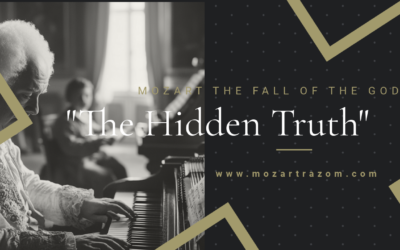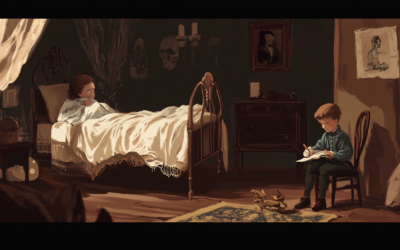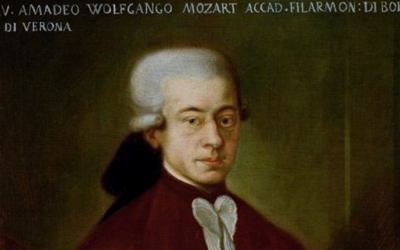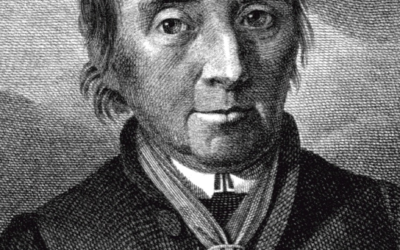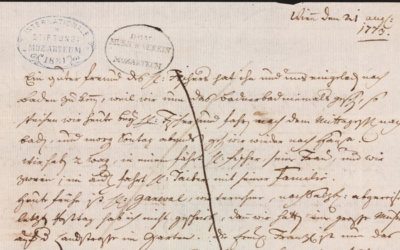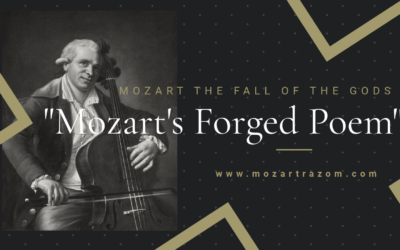Mozart, Wagner, and the Nazi Myth
How National Socialism Reinvented a Musical Legacy
The Führer’s admiration for Wagner’s racially charged ideology not only influenced the policies of the Nazi regime but also reshaped the legacy of Mozart. Under National Socialism, Mozart was not celebrated as a universal genius but as a symbol of German purity and superiority. His music, stripped of its international influence, was rebranded as an expression of Aryan identity, intended to unify and inspire the German people.
This reinvention extended beyond the concert halls and festivals; it infiltrated German society, influencing education, cultural programs, and the media. Mozart’s image became a tool of propaganda, aligning with the National Socialist agenda, while Jewish and foreign composers were systematically erased from the narrative. The myth of a racially pure Mozart was central to the Nazi effort to control and redefine Germany’s cultural heritage.
Mozart: The Fall of the Gods
This book compiles the results of our studies on 18th-century music and Mozart, who has been revered for over two centuries as a deity. We dismantle the baseless cult of Mozart and strip away the clichés that falsely present him as a natural genius, revealing the contradictions in conventional biographies. In this work, divided into two parts, we identify and critically analyze several contradictory points in the vast Mozart bibliography. Each of the nearly 2,000 citations is meticulously sourced, allowing readers to verify the findings. This critical biography of Mozart emerges from these premises, addressing the numerous doubts raised by researchers.
"The Viennese portrait of Mozart as the great Aryan coincided with the claims of exiled composers Weill and Schönberg, who believed themselves to be his true German heirs."
Mozart: The Fall of the Gods
Wagner’s Influence on Nazi Ideology
The Führer’s admiration for Richard Wagner’s music and his racially charged writings laid the cultural foundation for National Socialist ideology. Wagner’s views on the Jewish people, expressed with shocking clarity, became a tool for reshaping German identity and, by extension, the narrative surrounding Mozart’s legacy.
Wagner’s Anti-Semitism and Its Consequences
Wagner claimed that the Jewish people, who, as he noted, had “a God of their own,” were marked by a repulsive appearance regardless of their European nationality. According to him, Jews were “incapable of living” and could “never possess the art of sound.” He observed, with a chilling foresight, that Jews needed to redeem themselves “through self-annihilation.” Wagner’s essay Judaism in Music was not, as some claim, the epilogue of anti-Semitism in a cultural-political sense, but rather its origin.
Personal Cruelty and Tyranny
Wagner’s behavior was tyrannical, marked by cruelty towards individuals like Levi, the son of a rabbi, whom he attempted to coerce into baptism. When Levi begged to be excused from directing Parsifal, Wagner’s sadistic, calculated response mirrored the cat-and-mouse games that philosopher Adorno would later describe.
The Evolution of Wagner’s Racial Ideology
The composer’s anti-Semitism evolved into the “ominous biological racism of his late Bayreuth period,” a strain that grew within Germany until 1945 and extended to the interpretation of Mozart. Mozart was exalted for his supposed Aryan and Dinaric characteristics. For over three decades, Wagner incited hatred against Jews and foreigners. In his 1881 work Know Thyself, he proposed ideas that foreshadowed Hitler’s “final solution”: “Only the Jews remain without hope of salvation.” For Wagner, the Jew, the “demon of man’s ruin,” could never be racially improved; no matter whom they married, “a Jew would always be born.”
The Viennese School and Its Exclusion of Jewish Composers
The so-called “Viennese classicism” reflected the narrow, xenophobic, racist, and pan-Germanic views of the small bourgeois class. In the programs of the “First Viennese School,” there was no place for Jewish composers, aligning perfectly with Wagner’s vision of Judaism in music. The racial purity guaranteed the quality of performances. People were convinced of “the greatness of the musical tradition,” “the enormous German contribution to world culture,” and “the wealth of the Germano-centric popular repertoire,” while simultaneously being stirred to defend their traditions against foreigners.
Antisemitism in German Folk Music
Amid the trinitarian music of Haydn, Mozart, and Beethoven (HMB), distinctly antisemitic völkisch songs emerged, designed to transmit the “authentic Germanic feeling.” Youth events concluded with Anton Wilhelm Florentin von Zuccalmaglio’s (1803-1869) “Kein schöner Land,” an anthem embraced by early National Socialists.
Economic Crisis and Cultural Propaganda
The spirit of Richard Strauss, as evoked by Damisch, intertwined with the melodies of Roßbach’s Spielschar at the early Mozart Festivals in Salzburg until the economic crisis of 1929, when cultural activities dwindled. The Berliner Philharmoniker was forced to merge with the little-known Berliner Symphoniker, becoming the official ensemble of the German Reich, spreading Nazi ideology on a larger scale.
The 175th Anniversary of Mozart: A Nationalist Rebirth
Mozart’s 175th birthday celebration became the much-anticipated moment for national resurgence. His music was used to reinforce a sense of unity feared to be lost, even as groups like the Spielschar Ekkehard tried to maintain it through the streets with anti-Semitic songs and Mozart’s Lieder.
The 1931 Festival and the Reinvention of Mozart
At the 1931 Festival, Mozart’s music was cloaked in internationalism, cosmopolitanism, and universalism, which concealed a singular interest: Germany. Mozart’s work, considered timeless, was labelled “übernational” (supranational) rather than “international.” It was, in reality, an expression of German identity, perceived as so profound and privileged that only the German people could achieve the absolute through the art of sound.
German Musicology and the Illusion of Universality
According to Guido Adler (1855-1891), the father of German musicology, and Robert Hirschfeld (1857-1914), Mozart’s cosmopolitanism was ironic, as it too was a form of Germanocentrism. For composers like Arnold Schönberg (1874-1951), Heinrich Schenker (1868-1935), and Paul Hindemith (1895-1963), the achievements of so-called “pure music” were the tangible evidence of a transcendent universalism confined to German culture. They believed that the works of Bach, Haydn, Mozart, Beethoven, and Brahms could set precise standards for evaluating all other compositional techniques.
The Nazi Celebration of Mozart in 1941
The irony reached its peak when the Nazis celebrated the 1941 Mozart Jubilee in Vienna, with enthusiastic participation from figures such as Richard Strauss (1864-1949), Wilhelm Furtwängler (1886-1954), and the entire German musicological community. The Viennese portrait of Mozart as the great Aryan coincided with the claims made by exiled composers Kurt Weill (1900-1950) and Arnold Schönberg in America during the 1940s. While the Festival took place in Vienna, these emigrant composers were convinced that they, not others, were the legitimate German heirs of Mozart.
The Marginalization of Alfred Einstein
In 1931, Alfred Einstein published Don Giovanni for Eulenburg editions in Leipzig, expressing in the preface his hope that the work would foster “a new spiritual sense of music” and serve as an example to Germans to keep their distance from philosophical interference. However, his prophecy failed: the academic establishment, driven by the antisemitism of those same philosophers, ultimately denied him employment opportunities at the university level.
The Crisis and Oscar von Pander’s Perspective
In the same year, Oscar von Pander (1883-1968) reiterated in Münchner neueste Nachrichten that Mozart’s unique style was unparalleled for its precision and emotional purity, despite Mozart’s composition in over sixty different styles with inconsistent results. Pander’s suggestion to hold up Mozart as a model for contemporary German composers seemed the ideal paradigm during those devastating economic times.
You May Also Like
#2 The Hidden Truth of Mozart’s Education
In this video, we uncover the hidden truth behind Wolfgang Amadeus Mozart’s early education and challenge the long-held belief in his effortless genius. While history often celebrates Mozart as a child prodigy, effortlessly composing music from a young age, the reality is far more complex.
The London Notebook
The London Notebook exposes the limitations of young Mozart’s compositional skills and questions the myth of his early genius. His simplistic pieces, fraught with errors, reveal a child still grappling with fundamental musical concepts.
The Mozart Question
In this revealing interview, we delve into the lesser-known aspects of Wolfgang Amadeus Mozart’s life, challenging the long-standing myth of his genius. A Swedish journalist explores how Mozart’s legacy has been shaped and manipulated over time, shedding light on the crucial role played by his father, Leopold, in crafting the career of the famed composer.
Georg Nissen and the Missing Notebooks
After Mozart's death, his widow, Constanze, found a steadfast partner in Georg Nikolaus von Nissen, a Danish diplomat who dedicated his life to preserving the composer's legacy. Nissen not only compiled an extensive biography of Mozart but also uncovered and...
Letters Under Surveillance
In a world without privacy, Leopold Mozart’s letters were carefully crafted not just to inform but to manipulate perceptions. His correspondence reveals a calculated effort to elevate his family’s status while avoiding any mention of failure or controversy.
#3 Leopold Mozart’s Literary Theft
Hidden within the Mozarteum’s archives lies a poem that has long been hailed as a tribute to the young Mozart children. But behind this innocent façade is a story of deception, literary theft, and one father’s ambition to rewrite history.


